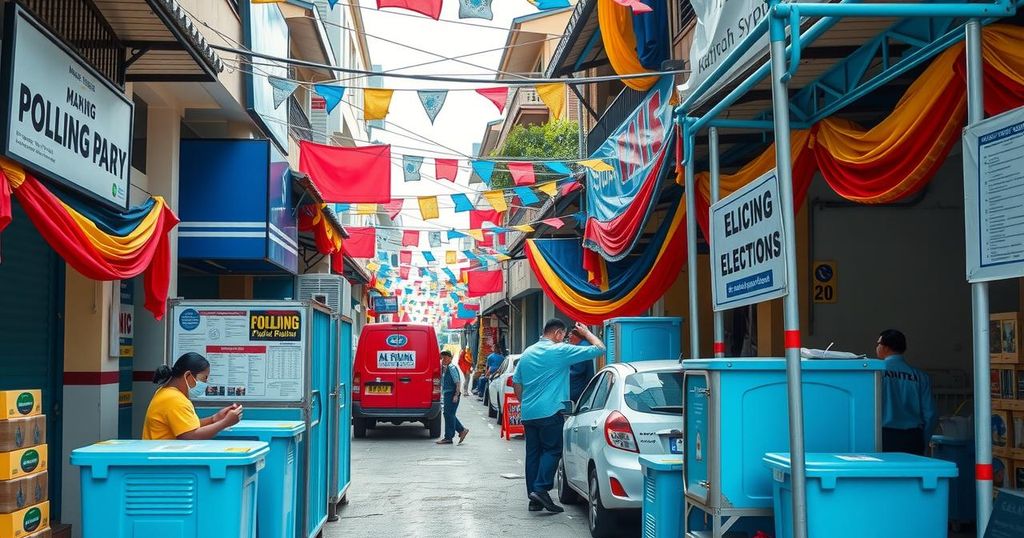Philippines Election: Marcos-Duterte Feud Dominates Mid-Term Vote
Philippines heads to mid-term elections as a significant feud between President Ferdinand Marcos and impeached Vice President Sara Duterte comes to a boil. With over 18,000 posts up for grabs, the Senate race is particularly crucial as it could influence future political dynamics and upcoming impeachment trials. Security measures are heightened due to violence reported ahead of the elections.
Millions of Filipinos will cast their votes this Monday as the country embarks on a mid-term election perceived as a crucial referendum on the intensifying feud between President Ferdinand Marcos and the recently impeached Vice President, Sara Duterte. Polling stations have been set up across the capital, Manila, in preparation for this significant event, which will determine more than 18,000 positions, from House representatives to various municipal officials.
The Senate race is drawing particular attention, as it will not only influence the forthcoming 2028 presidential elections but will also play a critical role in the impeachment trial of Sara Duterte scheduled for July. The outcome will affect her ability to hold public office in the future, as the 12 senators who are elected will serve as half the jury in her trial.
The tensions between Duterte and Marcos escalated notably in February when the Vice President was impeached by the House for alleged serious transgressions, including corruption and a conspiracy to harm the President. Moreover, in a dramatic development, former President Rodrigo Duterte, Sara’s father, was taken to the International Criminal Court (ICC) the same day to answer accusations of crimes against humanity tied to his administration’s controversial anti-drug campaign.
In order to maintain prospects for a future presidential campaign, Sara Duterte requires a minimum of nine votes from the 24-seat Senate. Heading into the polling day, seven candidates are aligned with Marcos while four support her. Interestingly, Marcos’s independent-minded sister, Imee Marcos, was recently adopted into the Duterte family’s political party.
This Fusion was seen as an attempt to strengthen alliances to better protect Vice President Duterte from potential impeachment consequences. At her final rally, Duterte made claims of potential electoral fraud and reiterated her condemnation of her father’s transfer to the ICC, calling it a form of kidnapping. Despite his legal troubles, Rodrigo Duterte remains on the ballot, aiming to reclaim his former position as mayor in Davao City, where it is speculated he will likely achieve victory.
Election security has become a primary concern as national police, anticipating violence, have deployed around 163,000 officers to safeguard voting locations. These officers are meant to escort election officials and secure checkpoints across the nation. Recent events have underscored the volatility of the election period; at least 16 individuals have been murdered in various localized violence incidents leading up to Monday’s elections. In one notable incident, a candidate in southern Mindanao was killed during an armed confrontation with law enforcement.
Moreover, authorities in Cebu apprehended several individuals on Saturday for unlawfully transporting a substantial amount of cash, which is strictly prohibited under election laws designed to curb bribery and corruption. Investigations are ongoing in both violent incidents, reflecting just how critical and charged the atmosphere remains as the Philippines heads into this pivotal election.
As millions of Filipinos prepare to vote in a pivotal mid-term election, the dramatic feud between President Ferdinand Marcos and Vice President Sara Duterte takes center stage. With major implications for both the Senate race and the potential for an upcoming impeachment trial, this election may shape the future political landscape of the Philippines significantly. Amid heightened security and violent incidents, the nation observes closely how these elections will unfold, bearing witness to their potential consequences on the country’s governance.
Original Source: sg.news.yahoo.com




Post Comment